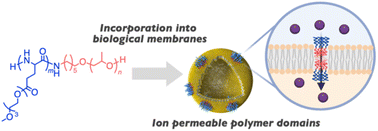Synthetic ion channels represent an emerging class of therapeutics. However, most synthetic ion channels are derived from small molecules, whose rapid clearance from the body limits their therapeutic potential. Here, we report macromolecular ion transport systems based on amphiphilic polyether block copolymers. The block copolymers self-assemble into vesicles that are spontaneously incorporated into biological membranes to form polymer-rich domains. The hydrophobic core of the domains, which features ether–oxygen atoms and the presence of water molecules, is analogous to the permeation pathways of natural ion channels such as KcsA. In addition, the inherent thermoresponsive properties of these polymer domains enable on/off switching of ion transport in response to temperature variations, allowing for controlled modulation of cation permeability. Thus, these domains act as macromolecular ion transport systems to disrupt ion homeostasis and trigger apoptosis in cancer cells. The systemic administration of the vesicles in tumor-bearing mice resulted in an accumulation at the tumor sites, inhibiting tumor growth. This work establishes thermoresponsive polyether block copolymers as a versatile and biologically active platform for macromolecular ion transport systems.


